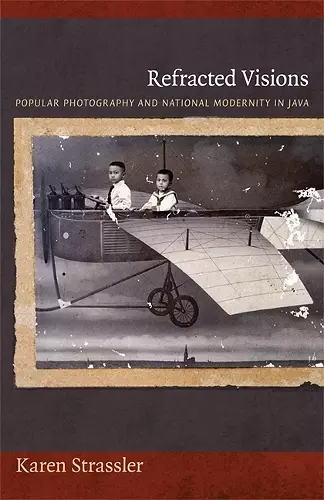Refracted Visions
Popular Photography and National Modernity in Java
Format:Paperback
Publisher:Duke University Press
Published:20th Apr '10
Currently unavailable, and unfortunately no date known when it will be back

An illustrated study of the ways in which photography and visual culture have influenced people in Java to see themselves as Indonesians.
A generously illustrated ethnography arguing that popular photographic practices have played a crucial role in the making of modern national subjects in postcolonial Java.A young couple poses before a painted backdrop depicting a modern building set in a volcanic landscape; a college student grabs his camera as he heads to a political demonstration; a man poses stiffly for his identity photograph; amateur photographers look for picturesque images in a rural village; an old woman leafs through a family album. In Refracted Visions, Karen Strassler argues that popular photographic practices such as these have played a crucial role in the making of modern national subjects in postcolonial Java. Contending that photographic genres cultivate distinctive ways of seeing and positioning oneself and others within the affective, ideological, and temporal location of Indonesia, she examines genres ranging from state identification photos to pictures documenting family rituals.
Oriented to projects of selfhood, memory, and social affiliation, popular photographs recast national iconographies in an intimate register. They convey the longings of Indonesian national modernity: nostalgia for rural idylls and “tradition,” desires for the trappings of modernity and affluence, dreams of historical agency, and hopes for political authenticity. Yet photography also brings people into contact with ideas and images that transcend and at times undermine a strictly national frame. Photography’s primary practitioners in the postcolonial era have been Chinese Indonesians. Acting as cultural brokers who translate global and colonial imageries into national idioms, these members of a transnational minority have helped shape the visual contours of Indonesian belonging even as their own place within the nation remains tenuous. Refracted Visions illuminates the ways that everyday photographic practices generate visual habits that in turn give rise to political subjects and communities.
“This is a heavy book to hold in one’s hands, printed on glossy paper, with hundreds of photographs, for a really good price, an album of modern Indonesian history, from the 1900s to 2000s; and, as one turns the pages, first quickly and then increasingly slowly, the book is full of wonderful writing. . . . Strassler’s book is extraordinary.” - Rudolf MrÁzek, Journal of Asian Studies “Refracted Visions is an innovative and inspiring book because it demonstrates eloquently how people in urban Java started to participate
in national modernity through photography. . . . [T]his highly original and well written book, with no fewer than 127 telling illustrations, is a landmark in the anthropology of visuality. . . . Refracted Visions is, in my view, a strong candidate to win prestigious academic prizes.” - Henk Schulte Nordholt, Asian Studies Review “In conclusion, the main contribution of Refracted Visions lies in its conceptualization of popular photographs as exceeding the private domain and engaging with collective aspirations and affiliations in ways that both support and subvert them. This point should be taken as a caution against the common display of photographs of late colonial and early postcolonial Asia to evoke nostalgia for a depoliticized, aestheticized past that never was.”
- Maurizio Peleggi, Pacific Affairs “. . . [N]ot only an in-depth study of ethnic Chinese in Indonesian photographic history, but a beautifully written historical study of visuality, representation and the cultural significance of popular photography in the context of colonial and post-colonial Java.” - Charlotte Setijadi-Dunn, Inside Indonesia “Refracted Visions is a tour de force. Karen Strassler has a sophisticated grasp of contemporary theories of representation in both anthropology and photography studies, a deep and carefully attentive ethnographic eye, and a refined aesthetic sensibility. She limns the boundary between new historicist cultural studies and old fashioned anthropology with uncommon grace.”-Rosalind C. Morris, editor of Photographies East: The Camera and Its Histories in East and Southeast Asia “Refracted Visions is a genuinely marvelous work which merits reading and rereading.”-John Pemberton, author of On the Subject of “Java”“Refracted Visions is a truly brilliant piece of work, beautifully written and characterized by a profound learning and engagement with Indonesian ethnography and a range of debates around visuality and representation. It will be hailed as a classic.”-Christopher Pinney, author of The Coming of Photography in India “. . . [N]ot only an in-depth study of ethnic Chinese in Indonesian photographic history, but a beautifully written historical study of visuality, representation and the cultural significance of popular photography in the context of colonial and post-colonial Java.” - Charlotte Setijadi-Dunn (Inside Indonesia) “Refracted Visions is an innovative and inspiring book because it demonstrates eloquently how people in urban Java started to participate
in national modernity through photography. . . . [T]his highly original and well written book, with no fewer than 127 telling illustrations, is a landmark in the anthropology of visuality. . . . Refracted Visions is, in my view, a strong candidate to win prestigious academic prizes.” - Henk Schulte Nordholt (Asian Studies Review) “In conclusion, the main contribution of Refracted Visions lies in its conceptualization of popular photographs as exceeding the private domain and engaging with collective aspirations and affiliations in ways that both support and subvert them. This point should be taken as a caution against the common display of photographs of late colonial and early postcolonial Asia to evoke nostalgia for a depoliticized, aestheticized past that never was.”
- Maurizio Peleggi (Pacific Affairs) “This is a heavy book to hold in one’s hands, printed on glossy paper, with hundreds of photographs, for a really good price, an album of modern Indonesian history, from the 1900s to 2000s; and, as one turns the pages, first quickly and then increasingly slowly, the book is full of wonderful writing. . . . Strassler’s book is extraordinary.” - Rudolf Mrázek (Journal of Asian Studies)
ISBN: 9780822346111
Dimensions: unknown
Weight: 794g
400 pages